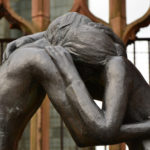We run our website the way we wished the whole internet worked: we provide high quality original content with no ads. We are funded solely by your direct support. Please consider supporting this project.

Repent! … From the Sin of Religion
People often think that being Christian is about “being religious,” but loving others in the way that Christ instructs us is about as far removed from religion as anything could be. Religion, as I use the term, is a system of beliefs and behaviors one embraces as a means of getting life—whether this be feeling close to God, one with the universe, or righteous before others.
While all religions, including the Christian religion, contain much wisdom and do much good in the world, they also can do much harm. The harm is not only in the vast amounts of blood they have spilled advancing their causes and defending the correctness of their positions. It is found in the fact that they may systematically prevent people from experiencing the love and life of God as a free gift flowing to and through them. So long as one is trying to achieve a relationship with God, he or she cannot receive a relationship with God by grace.
In this light, the religion of Christianity is the most tragic example of the harm religion sometimes causes. It is in some ways the most fundamental denial of the life and message Jesus came to bring. For the fallen idolatrous behavior of the Christian religion is carried out in the name of the One who came to set us free from the need for idolatrous behavior.
We who are the body of Christ need to repent, individually and collectively. We need to ask forgiveness from God, and from the world, for being religious. We have striven to be religious when we were called to be loving. We need to confess that we have sinned in the gravest fashion by frequently loving our vision of truth and ethics more than people, and even God himself.
To cite a few examples of our sins of religion, historically, and still today, we have not outrageously loved heretics. To the contrary, the church has often burned them alive. The white church has not outrageously loved blacks: Large segments of the American white church defended slavery and continue to support racist social structures. The white church has not outrageously loved Native Americans: In the name of Jesus it helped steal their land and extinguish their culture. The church as a whole has not outrageously loved Jews, Muslims, and other religious groups: We have rather frequently spoken evil of them and warred against them. And we have not outrageously loved large groups of targeted sinners whom we defined as outside our perimeters: prostitutes, gays, drug addicts, murderers, and others. Instead of standing in solidarity with these and all other sinners, we have eaten from the forbidden tree and constructed our own self-serving sin list to determine who’s “in” and who’s “out.” We have judged these people for whom Christ died and, rather than serve him, have often gone out of our way to make their lives miserable.
Our life is not found in our correct doctrine or in our piety, as important as these are. To get life from these things is religion. Our life is rather found in Jesus Christ, and in Jesus Christ alone. When we repent of our religion and commit to seeing God, ourselves, and every person we encounter only as he or she is revealed in Jesus Christ, and as we allow God’s Spirit to express this truth through our outrageous sacrificial love, the world will come to acknowledge that Jesus Christ is Lord, as Jesus himself promised.
—Adapted from Repenting of Religion, 225-228
Image by Hartmut Tobies
Category: General
Tags: Judgment, Living in Love, Love, Religion, Religious Idolatry, Repenting of Religion, Servant
Topics: Following Jesus
Related Reading

The Coming Kingdom & Racial Conflict
In the book of Revelation, we see a glimpse into the future. John says he saw, …a great multitude that no one could count, from every nation, tribe, people and language, standing before the throne and in front of the Lamb. They were wearing white robes and were holding palm branches in their hands. And…

Goodbye Beloved “Friend at First Sight”
I don’t believe in “love at first sight,” but I do believe that once in a great while, some fortunate people encounter “friends at first sight.” Maybe you know what I’m talking about. There are certain people whose chemistry just seems to draw you in. Minutes after meeting them you find yourself engaging with them,…

Love Conquers All
Paul prayed in this way for the church at Ephesus: I pray that, according to the riches of his glory, [God] may grant that you may be strengthened in your inner being with power through his Spirit, and that Christ may dwell in your hearts through faith, as you are being rooted and grounded in…

The Longing of Advent
The Advent season is a time of anticipating the coming of God, in Christ, a time of turning our imagination toward the revelation of God’s love for us. This after all is the deepest longing of our heart, and our natural longings always point us to something real. We grow hungry only because there’s such…

5 Differences Between The Kingdom of God and the Kingdom of the World
Image by matthijs rouw via Flickr The kingdom of God looks and acts like Jesus Christ, like Calvary, like God’s eternal, triune love. It consists of people graciously embracing others and sacrificing themselves in service to others. It consists of people trusting and employing “power under” rather than “power over,” even when they, like Jesus, suffer because…

